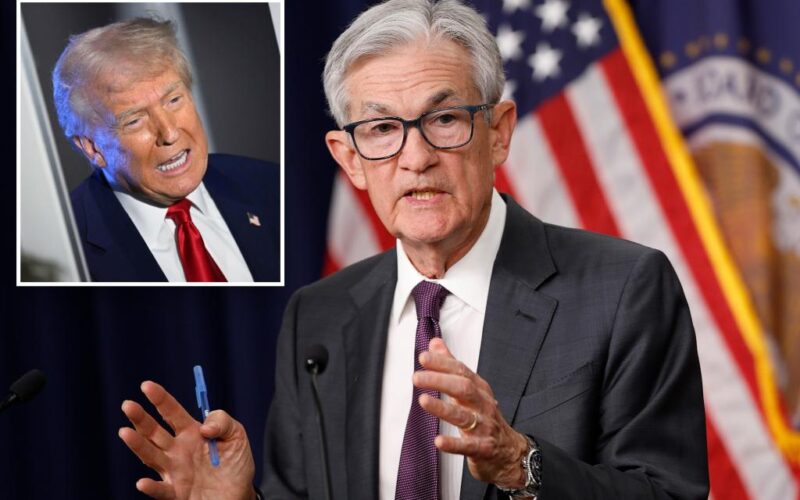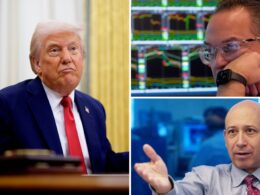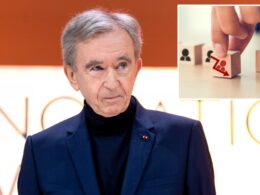Federal Reserve Chair Jerome Powell on Friday rebuffed President Trump’s call for the central bank to immediately cut interest rates — warning that that administration’s sweeping new tariffs are likely to push inflation higher and slow economic growth.
Powell acknowledged the strength of the current US economy but emphasized that the Fed is navigating a “highly uncertain outlook” following Trump’s announcement on Wednesday of 10% tariffs on all imports, alongside even steeper reciprocal measures for key trading partners.
“Our obligation is to keep longer-term inflation expectations well anchored and to make certain that a one-time increase in the price level does not become an ongoing inflation problem,” Powell told a room of business journalists in Arlington, Va., on Friday.
“We are well positioned to wait for greater clarity before considering any adjustments to our policy stance. It is too soon to say what will be the appropriate path for monetary policy.”
His remarks follow a sharp escalation of tensions between the Fed and the White House.
Moments before Powell took the podium, Trump urged the Fed boss to “stop playing politics” and slash interest rates in light of recent economic data showing a decline in inflation.
“This would be a perfect time for Fed Chairman Jerome Powell to cut Interest Rates. He is always ‘late,’ but he could now change his image, and quickly,” Trump wrote on his social media site Truth Social.
“Energy prices are down, Interest Rates are down, Inflation is down, even Eggs are down 69%, and Jobs are UP, all within two months — A BIG WIN for America. CUT INTEREST RATES, JEROME, AND STOP PLAYING POLITICS!”
The Fed kept interest rates unchanged — between 4.25% and 4.50% — at its meeting last month and the central bankers are not scheduled to meet again until early May.
Wall Street has crated since Trump announced his “Liberation Day” tariffs.
Investors are growing increasingly concerned about the economic ripple effects, and markets have started pricing in the likelihood of multiple rate cuts from the Fed this year — some projecting as much as a full percentage point reduction by December.
Powell’s appearance at the Society for Advancing Business Editing and Writing (SABEW) conference served as a timely platform to address growing market volatility and the uncertainty surrounding the administration’s aggressive trade moves.
While he offered no firm direction on future rate moves, his message was clear: the Fed is watching closely, but it’s not ready to act just yet.
Several Fed officials have since echoed the need for caution, indicating a preference to pause any policy changes until there’s more clarity on the economic effects of the administration’s trade moves.
Powell acknowledged the scope of the tariffs, saying they were “significantly larger than expected,” and warned that the economic fallout could be equally outsized.
“The same is likely to be true of the economic effects, which will include higher inflation and slower growth,” he said.
“The size and duration of these effects remain uncertain.”
Despite mounting pressure from markets and political figures, Powell maintained the Fed’s measured stance, underscoring that the central bank will be particularly attentive to inflation expectations.
“While tariffs are highly likely to generate at least a temporary rise in inflation, it is also possible that the effects could be more persistent,” he said.
“Avoiding that outcome would depend on keeping longer-term inflation expectations well anchored, on the size of the effects, and on how long it takes for them to pass through fully to prices.”
Economists typically view tariffs as a short-term shock to prices rather than a systemic inflation driver.
However, the scale and breadth of Trump’s measures — which affect a wide swath of goods and trading partners — could challenge that assumption and force a re-evaluation within the Fed.
Although Powell refrained from offering a timeline for any policy changes, he made it clear that the central bank’s dual mandate of price stability and maximum employment would guide future decisions.
“Meeting the inflation side of our mandate will require close monitoring of inflation expectations,” he said.
The most recent data showed core inflation rising at a 2.8% annual pace in February, a rate above the Fed’s 2% target but part of an overall moderating trend.
A study by the Yale Budget Lab forecast inflation to soar by another 2.3 percentage points by the end of the year from the new tariffs.
Still, Powell struck a relatively optimistic tone about the broader economy.
“The economy is still in a good place,” he noted, pointing to strong labor market data.








